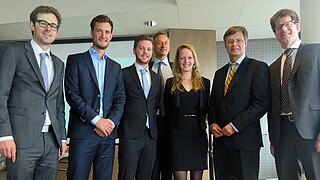Van Heijst looked into a number of aspects, including the user satisfaction score of the drivers using the valet parking service and the efficiency of the recharging process. He developed a software application for the project that makes it easier to schedule and review charging activities. This software takes into account the number of vehicles, the available charge points and when the drivers have indicated that they wish to pick up their vehicles again – minus the recharging time. “It also provides insight into the traditional peak and off-peak hours in vehicle recharging and creates opportunities to spread charging sessions over the course of the day,” says Van Heijst. “This reduces peak loads on the electricity network and allows us to utilise the available power more efficiently.”
Research
A total of four students in RSM’s Business Information Management master programme have researched different components of driving electric, in studies commissioned by Dutch grid operator Stedin. Brenda Janssen studied the drivers, their income, urban situation and non-financial motives to drive an electric vehicle. Glenn de Jong’s study went into the business model for the chargers, the costs, the urban situation and the transactions. And finally, Connie Lai studied the recharging behaviour of drivers of electric vehicles and their willingness to share a charge point in response to financial and social stimuli.
Growth
In the past few years, we have witnessed an explosive increase in the number of full- and semi-electric vehicles on the Dutch roads. This is accompanied by widespread investment in new charge points. Nevertheless, there are still too few charge points at company parking lots and public car parks. Installing additional charge points at such sites would involve a substantial investment. In 2015, three RSM students already concluded that a staffed parking or valet charging service actually forms the most affordable and sustainable solution. This led to the establishment of a consortium that enabled researchers to launch a test project and work out the study in further detail.
Over-50s
The innovative ‘valet charging’ concept has proven itself as a means to help people over the age 50 to find a job. “It’s a unique service,” says Floris Vervat, the director of chauffeur service company Jeeves. “And people over 50 are ideally suited for this kind of work. Generally speaking, they are people who still – let’s say – ‘know how it should be done’. We’ve concentrated on recruiting people with good driving skills, who are familiar with different marques of car, dress the right way and are hospitable.” Social investor Start Foundation joined in and helped Jeeves to recruit drivers among people on unemployment benefits.
Sustainable
And as far as sustainability is concerned, the concept ticks all the right boxes. Valet charging ensures that expensive charge points are used more effectively, cars are fully recharged, and helps create jobs for people who are at a relative disadvantage in today’s employment market.
Baerte de Brey, electric transport manager at Stedin, concludes: “This is another step forward in the energy transition: a sustainable and social concept that will continue to expand further over time. Other sectors that we can look into include offices and industrial estates – but also public locations like hospitals.”
EY is also enthusiastic about the project: “We were surprised to see just how enthusiastically our staff received this valet service,” says Roel Drost, EY’s senior manager cleantech and sustainability. “With around 100 electric cars in our car park and 40 charge points, we currently have a shortage of EV charging facilities. Valet charging helps us to avoid the risk of our employees becoming stuck with an empty battery while en route to a client.”

